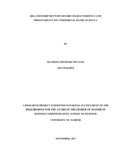| dc.description.abstract | In today’s globalized, ever-changing, and competitive business landscape, corporate boards have become critical for the smooth operation of organizations. More than ever, boards are expected to perform not just the monitoring of management but provide strategic directions especially in times of crisis. Research Objective was to ascertain the relationship between board characteristics and profitability of commercial banks in Kenya. This study was based on three theories: Stewardship theory, agency theory, and resource dependency theory. The research used analytical and cross-sectional research design in studying the characteristics of board and the impact it has on profitability among the commercial banks operating in the Kenyan market. The population used in this study was all commercial banks regulated by CBK. The study was a census survey covering all the 43 commercial banks in existence in Kenya. The banks were classified into local private commercial banks, local public commercial banks, and foreign commercial banks. The researcher collected data from 2012 – 2016 for 43 commercial banks operating in the Kenyan market. The study used secondary data on the study variables include board expertise, board size, board independence, gender diversity and Firm Profitability (ROA) which was obtained from audited financial statements which are available at the CBK website (www.central.go.ke). The study covered descriptive and inferential statistics. Descriptive statistic was conducted through multiple comparisons of the means from the variables and trend analysis. On the other hand, inferential statistics used Pearson product moment correlation analysis design and analysis through regression method. Correlation coefficient was used by the researcher to describe the relationship between the study independent and dependent variables. The study used coefficient of determination to evaluate the model fit. The model had an average adjusted coefficient of determination (R2) of 0.578 and which implied that 57.8% of the variations in commercial bank profitability are explained by the board characteristics investigated. The study findings indicate that there is a significant positive relationship between the factors under study and financial performance of commercial banks: board expertise, board size, director independence, board diversity and it indicated that they influenced profitability of commercial banks. Based on the findings of this study, there is a need to improve board characteristics, in terms of board expertise, board size, director independence and board diversity so as to improve the profitability of commercial banks in Kenya. Thus, there are some practical recommendations for possible reform on board characteristics in order to better improve the profitability of commercial banks in Kenya. | en_US |



